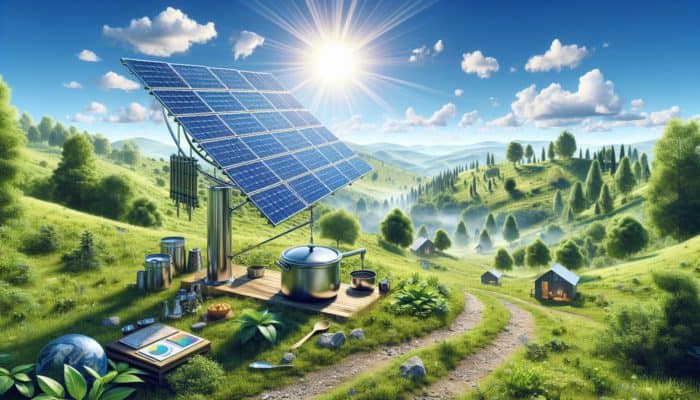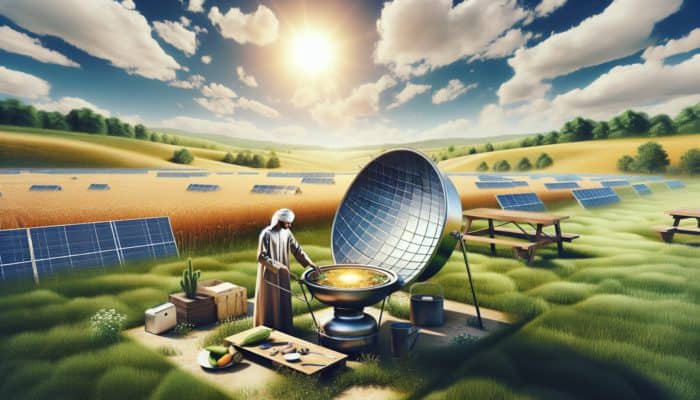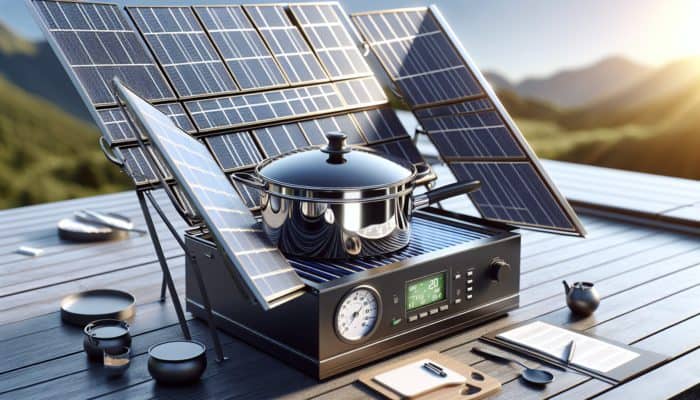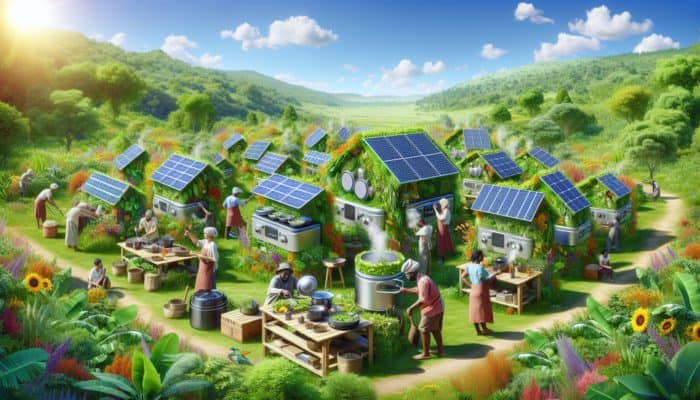Explore the World of Solar-Powered Cooking
What Exactly is Solar-Powered Cooking?

How to Cook with Solar-Powered Appliances: Solar-powered cooking leverages the abundant energy from the sun to heat and cook food, providing a sustainable and environmentally friendly alternative to conventional cooking methods. As awareness surrounding climate change grows and the demand for cleaner energy sources increases, solar cooking emerges as an innovative solution to reduce reliance on fossil fuels and lower carbon emissions. This cooking method is particularly beneficial in areas where electricity is limited or inconsistent, offering an efficient approach to meal preparation that utilises a free and renewable resource. By harnessing solar energy, we contribute to a more sustainable future while relishing delicious, home-cooked meals.
Discover the Various Types of Solar Cookers
A variety of solar cookers exist, each designed to cater to specific cooking requirements and environmental conditions. Familiarising yourself with these different types can help you select the perfect cooker that aligns with your lifestyle and culinary preferences.
- Box Cookers: These insulated boxes utilise flat panels to reflect sunlight into a cooking chamber, making them ideal for slow-cooking and baking.
- Panel Cookers: Made with reflective panels that direct sunlight into a pot, panel cookers are lightweight and portable, perfect for outdoor adventures like camping.
- Parabolic Cookers: These cookers concentrate sunlight onto a single focal point, achieving high temperatures rapidly, making them perfect for frying and boiling.
- Solar Ovens: Specifically designed for baking, these ovens can reach high temperatures and efficiently handle a variety of dishes.
Selecting the right type of solar cooker hinges on factors such as the specific dishes you wish to prepare, the climate in your area, and how frequently you plan to utilise the cooker. Each type offers distinct advantages, opening up possibilities for mouth-watering culinary creations powered solely by the sun.
Why Embrace Solar Cooking? Uncover the Benefits
Solar cooking brings a myriad of benefits that extend well beyond simple meal preparation. It represents a sustainable practice that contributes to environmental conservation while fostering a healthier lifestyle. Here are some of the most significant advantages:
- Energy Savings: Reduces dependence on traditional energy sources, leading to lower utility bills.
- Environmental Benefits: Minimises greenhouse gas emissions and curtails air pollution.
- Reliable Cooking During Power Outages: Offers a dependable cooking solution during emergencies when electricity is unavailable.
- Promotion of Sustainable Practices: Encourages the use of renewable energy, nurturing a sense of responsibility towards the environment.
Solar cooking not only fosters energy independence but also enhances community resilience, making it an excellent choice for individuals and families seeking a greener and more sustainable lifestyle.
How to Effectively Use a Solar Cooker for Optimal Results

To use a solar cooker effectively, follow a few straightforward steps to ensure peak performance and delightful outcomes. Begin by selecting a location with direct sunlight, ideally a spot that receives consistent sunlight throughout the cooking period. Please set up your cooker securely, ensuring it is stable and correctly oriented to capture sunlight effectively.
As you prepare your meal, adjust the cooker’s angle periodically to maintain direct exposure to the sun. Depending on the specific type of solar cooker, preheating may be necessary before placing your food inside, which can enhance the overall cooking efficiency.
Timing is crucial; solar cookers generally require longer cooking times compared to conventional methods due to their slower heat absorption. Keep a watchful eye on the food, using a thermometer to verify doneness, especially with meats and baked goods. With practice, you will master the art of solar cooking, enjoying a diverse range of meals prepared using the sun's power.
How is Solar Cooking Practised Worldwide?
Solar cooking has gained traction globally, highlighting its versatility and adaptability across diverse environments. In rural areas of Africa, for example, communities have adopted solar cookers to reduce their reliance on firewood, leading to decreased deforestation and improved air quality.
In countries such as India and Brazil, solar cooking initiatives are being implemented in schools and community kitchens, demonstrating how solar cookers can efficiently serve large groups of people. A notable example is the Solar Cooking Project in Rajasthan, India, where thousands of households have integrated solar cookers, significantly enhancing their health while reducing household expenses.
Urban areas also benefit from solar cooking, with city residents utilising rooftop gardens to harness solar energy for their culinary needs. These examples demonstrate the positive impact of solar cooking on local communities and the environment, paving the way for a more sustainable future worldwide.
How Does the Process of Solar Cooking Work?
Understanding the Principles of Solar Energy Conversion

Solar cooking functions based on the fundamental principles of solar energy conversion, where sunlight is transformed into heat through reflective surfaces and insulated cooking chambers. The primary components of solar cookers include:
- Reflective Panels: These surfaces capture and direct sunlight towards the cooking area.
- Insulated Cooking Chamber: Retains heat within the chamber, ensuring food cooks evenly and thoroughly.
- Cooking Pots: Dark-coloured pots are preferred as they absorb more heat, enhancing the overall cooking process and efficiency.
- Thermometers: Essential tools for monitoring internal temperatures and ensuring food safety throughout the cooking process.
The efficiency of solar cookers relies heavily on their design, positioning, and the intensity of the available sunlight. By effectively capturing solar energy, solar cookers can achieve cooking temperatures suitable for a wide variety of dishes, making them a feasible option for sustainable cooking practices.
How to Maximise the Efficiency of Solar Cooking?
Maximising the efficiency of solar cooking is crucial for achieving the best culinary results. Position your cooker in a location that receives direct sunlight for as long as possible, particularly during peak sunlight hours, to enhance its performance.
Utilising dark-coloured pots can significantly improve heat absorption, so choose cookware that optimises thermal efficiency. Additionally, consider wind protection; using a windbreak can help maintain consistent cooking temperatures, especially in breezy conditions, ensuring that your food cooks evenly.
Regular maintenance of your solar cooker is key to ensuring optimal performance. Check for any signs of wear and tear, clean the reflective surfaces regularly to ensure maximum sunlight absorption, and store the cooker properly when it's not in use. By adhering to these tips, you can enhance your solar cooking experience and expand your culinary possibilities.
Can You Prepare Any Dish in a Solar Cooker?
Absolutely, solar cookers are incredibly versatile and can be utilised to prepare a vast array of dishes. From hearty stews and soups to baked goods like bread and cakes, the options are virtually limitless.
However, it’s essential to understand that cooking times may vary significantly when compared to traditional cooking methods. Some recipes will require adjustments to accommodate the slower cooking process of solar cookers. For instance, stews benefit from a prolonged, slow cooking process to meld flavours beautifully, while baked goods may necessitate specific tweaks to ingredient ratios and cooking durations.
Experimentation is vital; start with simple recipes and gradually incorporate more complex dishes as you become comfortable with your cooker’s performance and capabilities. This adaptability makes solar cooking not only practical but also an exciting culinary adventure filled with discovery and exploration.
Insights from Experts on Cooking with Solar-Powered Appliances
Valuable Tips from Seasoned Solar Cooks
Experienced solar cooks often possess a wealth of knowledge that can help newcomers navigate the learning curve associated with solar cooking. One common piece of advice is to start cooking early in the day, as this allows ample time for your meals to cook without the added pressure of diminishing sunlight throughout the day.
Experimentation is key; many seasoned cooks recommend trying various recipes and adjusting cooking times accordingly. For example, one solar cook in Australia shared her success in baking a cake using a box cooker, discovering that preheating the cooker for about 30 minutes resulted in an even bake and delightful texture.
Keeping a cooking journal is also an excellent practice; documenting what works and what doesn’t can lead to successful recipes over time. Furthermore, joining online solar cooking communities can provide additional support and inspiration, allowing you to share your experiences and learn from others in the solar cooking realm.
What Challenges Might You Face When Solar Cooking?
While solar cooking presents numerous advantages, it does come with its own set of challenges. The most significant factor is reliance on weather conditions; overcast skies or rainy days can severely hinder cooking efforts and outcomes.
To effectively manage these challenges, it’s advisable to have alternative cooking methods on standby, particularly for individuals residing in areas with inconsistent weather patterns. Additionally, planning meals for sunny days will maximise the benefits and effectiveness of solar cooking.
Longer cooking times can also be a hurdle; understanding how to adapt recipes to accommodate the slower cooking process is crucial for success. Engaging with experienced solar cooks can offer practical solutions to common challenges, empowering you to optimise your solar cooking adventures and outcomes.
Expert Recommendations for Maintaining Your Solar Cooker
Proper maintenance is crucial for ensuring the longevity and optimal performance of solar cookers. Experts recommend several key practices to ensure your solar cooker functions optimally throughout its lifespan.
Start by regularly cleaning the reflective surfaces with a soft cloth to maintain maximum sunlight absorption. Additionally, inspect for any signs of wear and tear, particularly on the hinges or seals, since these can significantly impact performance and cooking results.
When not in use, store your cooker in a cool, dry place away from direct sunlight to prevent material degradation over time. It's also wise to check the cooking pots for scratches or damage, as these can impede cooking efficiency. By following these steps, you can enhance your solar cooker’s functionality and lifespan, ensuring many successful cooking experiences in the future.
What Are the Notable Benefits of Solar-Powered Cooking?
Understanding the Environmental Impact of Solar Cooking
Solar cooking serves as a powerful tool in reducing greenhouse gas emissions, making it a crucial component in the ongoing battle against climate change. By embracing solar energy, individuals can significantly reduce their reliance on non-renewable energy sources, thereby contributing to a meaningful reduction in their carbon footprint.
As more individuals adopt solar cooking practices, the collective impact can yield substantial environmental benefits. For example, communities that transition to solar cooking report fewer instances of deforestation, as the demand for firewood diminishes significantly.
Moreover, solar cooking promotes cleaner air quality by eliminating the smoke produced by traditional cooking methods. This aspect is especially beneficial in developing nations, where indoor air pollution from cooking fuels poses serious health risks to vulnerable populations. Through the practice of solar cooking, individuals not only enhance their culinary experiences but also contribute to global efforts aimed at combating climate change and preserving the environment.
Health Benefits Associated with the Use of Solar Cookers
Utilising solar cookers can bring about a multitude of health benefits, primarily by reducing indoor air pollution linked to conventional cooking methods. Traditional cooking fuels, such as wood and charcoal, emit harmful pollutants that can adversely affect respiratory health and overall well-being.
By transitioning to solar cooking, individuals can significantly improve air quality within their homes, resulting in healthier living environments for families. Furthermore, outdoor solar cooking encourages a more active lifestyle, allowing families to enjoy meals in natural settings, which can significantly enhance mental well-being and foster family bonding.
Solar cooking also promotes safer food preparation practices, as the consistent heat generated can reduce the risk of bacterial contamination in foods. Encouraging a shift toward solar cooking can lead to improved health outcomes, particularly in communities where traditional cooking methods are predominant.
Economic Advantages Associated with Solar Cooking
Solar cooking not only promotes environmental sustainability but also offers substantial economic benefits. By harnessing solar energy for culinary purposes, individuals can significantly reduce their energy expenses and lessen dependence on expensive fuels.
For families in developing regions, solar cooking serves as a cost-effective alternative to purchasing firewood or kerosene, leading to substantial savings over time. These savings can be redirected towards other critical needs such as education, healthcare, or nutrition.
Additionally, solar cooking can stimulate local economies as communities embrace this sustainable practice. By investing in solar cookers, countries can promote local manufacturing and create job opportunities, thereby contributing to economic growth while fostering environmental stewardship.
Versatility and Convenience Offered by Solar Cookers
Solar cookers are remarkably versatile, presenting various cooking methods that enhance flexibility in meal preparation. From baking to slow cooking, solar cookers can accommodate a wide range of culinary styles, making them suitable for diverse cuisines from around the world.
The convenience of solar cookers lies in their portability and ease of use. Many models are lightweight, making it easy to transport them to outdoor events, camping trips, or picnics. This portability encourages outdoor cooking experiences, facilitating social gatherings and community bonding over meals prepared using the sun’s energy.
Moreover, the ability to cook multiple dishes simultaneously adds to their convenience. For instance, you can bake bread while simmering a delicious stew, effectively optimising your time and resources. This versatility makes solar cookers an appealing choice for those looking to enhance their cooking repertoire sustainably while enjoying the benefits of solar energy.
Educational Value of Solar Cooking Practices
Solar cooking serves as an effective educational tool, fostering awareness and understanding of renewable energy sources among individuals. By engaging with solar cooking practices, individuals can learn about the principles of solar energy, energy conservation, and sustainability.
In educational settings, solar cookers can be integrated into science curricula, providing hands-on learning experiences for students of all ages. For instance, school projects can involve constructing simple solar cookers, allowing students to explore concepts of thermodynamics, energy transfer, and environmental science in a practical and engaging way. Moreover, solar cooking workshops can promote community engagement, encouraging participants to share their experiences and learn from one another. This collaborative approach not only enhances culinary skills but also deepens understanding of sustainable practices, nurturing a generation that values environmental responsibility and proactive participation in climate solutions.
Essential Tips for Successful Solar Cooking
How to Choose the Right Solar Cooker for Your Needs
Selecting the ideal solar cooker is crucial to maximising your solar cooking experience. Begin by assessing your cooking needs; consider the types of meals you plan to prepare, as different cookers offer varying capabilities tailored to specific dishes.
Portability is another crucial factor to consider. If you plan to travel or use your cooker at outdoor events, opt for a lightweight, foldable model that can be easily packed and transported. Cooking capacity is also vital; larger families or groups may require a cooker with a more extensive cooking area to accommodate multiple dishes efficiently.
Lastly, consider your budget. While some solar cookers can be quite affordable, investing in a high-quality model can enhance longevity and efficiency over time. Researching reviews and seeking recommendations can greatly aid in making an informed decision that best suits your lifestyle and culinary needs.
Adapting Cooking Techniques for Solar Cookers
Cooking with solar cookers necessitates a shift in techniques compared to traditional cooking methods. The key to success lies in embracing slow cooking; most solar cookers operate effectively at lower temperatures over extended periods, which requires adjustments in your approach.
Preheating your solar cooker can also play a vital role in achieving optimal results. Allowing the cooker to warm up sufficiently before adding food can significantly enhance cooking efficiency and the overall outcome. Selecting the right cookware is equally important; opt for dark, heavy pots that retain heat well, maximising the overall cooking process.
Incorporating techniques such as covering pots with lids helps trap heat and moisture, ensuring that food cooks evenly and thoroughly. Flexibility with recipes is crucial; adjusting cooking times and methods can lead to delicious outcomes that cater to the unique characteristics of solar cooking. Embracing these techniques can transform your solar cooking experience into a delightful culinary journey.
Safety Precautions to Follow When Using Solar Cookers
Safety is paramount when engaging in solar cooking practices. Always employ protective gloves when handling hot cookware, as solar cookers can reach high temperatures that may cause burns. Ensuring proper ventilation during the cooking process is also essential; if you’re using a solar oven, make sure it’s in a well-ventilated area to prevent overheating.
Position your solar cooker away from flammable materials to mitigate any risk of fire. It’s also advisable to keep a fire extinguisher or a bucket of water nearby as a precautionary measure during the cooking process. Finally, always supervise children and pets around the cooker to ensure their safety during the cooking experience. By adhering to these safety measures, you can enjoy the numerous benefits of solar cooking while minimising potential risks.
Envisioning the Future of Solar-Powered Cooking
Innovative Developments in Solar Cooking Technology
The future of solar-powered cooking appears promising, driven by continuous technological innovations that enhance efficiency and user-friendliness. Recent advancements have led to the development of materials that enhance heat retention while maintaining lightweight designs, thereby facilitating portability for users.
New solar cooker models now incorporate features such as built-in thermometers and timers, allowing for more precise cooking experiences. Ongoing research into high-efficiency reflective materials has also yielded significant improvements in sunlight capture, making solar cooking more accessible and effective for a wider audience.
These innovations open up exciting possibilities for culinary creations, allowing users to explore diverse cooking styles with greater ease. As technology continues to evolve, solar cooking is poised to become an increasingly popular choice for environmentally conscious individuals and families seeking to adopt sustainable living practices.
Integrating Solar Cooking with Other Renewable Technologies
The integration of solar cooking with other renewable energy technologies is emerging as a promising trend, enhancing the versatility and efficiency of solar-powered cooking solutions. For instance, combining solar cookers with photovoltaic systems can provide a more comprehensive energy solution, allowing users to harness solar energy for both cooking and electricity needs.
Additionally, innovations such as solar thermal collectors can augment cooking processes by providing hot water for food preparation, further expanding the capabilities and functionalities of solar cookers. These integrations not only enhance efficiency but also promote a holistic approach to sustainable living that encompasses multiple aspects of energy usage.
As communities increasingly adopt solar cooking alongside other green technologies, a more integrated and sustainable lifestyle can be achieved, paving the way for a future where renewable energy sources play a central role in our everyday lives and culinary practices.
The Significance of Solar Cooking in Sustainable Living Practices
Solar cooking plays a crucial role in promoting sustainable living, marking a significant shift toward eco-friendly practices that reduce reliance on fossil fuels and other non-renewable energy sources. By adopting solar cooking, individuals actively contribute to reducing carbon emissions and promoting a cleaner, healthier environment for all.
Incorporating solar cooking into daily routines encourages communities to engage with renewable energy practices, promoting a culture of sustainability that can inspire future generations. Furthermore, by utilising solar cookers, families can enhance their energy independence, reducing dependence on external energy sources that may not be sustainable in the long run.
As more individuals embrace solar cooking, a ripple effect is created, inspiring others to consider how they can incorporate renewable energy into their daily lives. The collective impact of solar cooking can lead to transformative changes in energy consumption patterns, promoting a more sustainable lifestyle for current and future generations.
The Global Adoption and Impact of Solar Cooking Initiatives
The global adoption of solar cooking is experiencing remarkable growth, with increasing recognition of its benefits in both developed and developing countries. In regions facing energy shortages, solar cookers provide a reliable and sustainable cooking solution, significantly impacting local communities and their culinary practices.
Countries such as Nepal and Kenya have adopted solar cooking as a means to mitigate deforestation and address the health risks associated with traditional cooking fuels. These initiatives not only enhance energy access but also empower communities by reducing the time spent gathering firewood and other fuels.
As awareness spreads, solar cooking is becoming a vital component of global sustainability efforts. By decreasing carbon footprints and promoting cleaner cooking alternatives, solar cooking contributes to a more resilient and environmentally friendly future. The movement towards solar cooking exemplifies how simple innovations can lead to significant positive changes around the world, fostering a sustainable and eco-conscious society.
Frequently Asked Questions about Solar Cooking
What is a solar cooker?
A solar cooker is a device that utilises sunlight to cook food by converting solar energy into heat, providing a sustainable alternative to traditional cooking methods while promoting eco-friendly practices.
Can I use any pot in a solar cooker?
While a variety of pots can be used, it is advisable to select dark, heavy cookware that absorbs heat efficiently, enhancing the overall cooking process and outcomes in solar cooking.
How long does it take to cook food in a solar cooker?
Cooking times can vary depending on the type of food and the solar cooker's efficiency; however, generally, expect longer cooking times compared to conventional cooking methods.
Can solar cookers work on cloudy days?
Solar cookers can function on cloudy days, but their efficiency is significantly reduced. It is advisable to plan your cooking on sunny days for optimal results and performance.
How do I clean my solar cooker effectively?
To clean your solar cooker, gently wipe down the reflective surfaces with a soft cloth. Ensure that all cooking pots are thoroughly washed after each use to maintain hygiene and optimal performance.
Are solar cookers safe to use in the kitchen?
Yes, solar cookers are safe when used properly. Always use protective gloves when handling hot items and ensure the cooker is positioned away from flammable materials to mitigate risks.
Can I bake in a solar cooker?
Yes, many solar cookers are capable of baking bread, cakes, and other baked goods, making them versatile for different cooking methods and culinary styles.
What are the primary benefits of solar cooking?
The benefits of solar cooking include reduced energy costs, decreased environmental impact, improved air quality, and the ability to cook during power outages, making it a practical choice for many.
Do solar cookers require regular maintenance?
Yes, regular maintenance, such as cleaning reflective surfaces and checking for wear, is essential to ensure optimal performance, longevity, and reliability of solar cookers.
Where can I buy a solar cooker?
Solar cookers can be purchased online through various retailers or specialised eco-friendly stores, which often offer a wide range of models to suit different needs and preferences.


